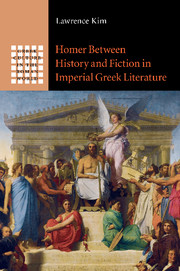Book contents
- Frontmatter
- Contents
- Acknowledgments
- Note on texts, translations, and abbreviations
- 1 Introduction: Imperial Homer, history, and fiction
- 2 Homer, poet and historian: Herodotus and Thucydides
- 3 Homer, the ideal historian: Strabo's Geography
- 4 Homer the liar: Dio Chrysostom's Trojan Oration
- 5 Homer on the island: Lucian's True Stories
- 6 Ghosts at Troy: Philostratus' Heroicus
- 7 Epilogue
- Works cited
- Index
- Index locorum
5 - Homer on the island: Lucian's True Stories
Published online by Cambridge University Press: 06 December 2010
- Frontmatter
- Contents
- Acknowledgments
- Note on texts, translations, and abbreviations
- 1 Introduction: Imperial Homer, history, and fiction
- 2 Homer, poet and historian: Herodotus and Thucydides
- 3 Homer, the ideal historian: Strabo's Geography
- 4 Homer the liar: Dio Chrysostom's Trojan Oration
- 5 Homer on the island: Lucian's True Stories
- 6 Ghosts at Troy: Philostratus' Heroicus
- 7 Epilogue
- Works cited
- Index
- Index locorum
Summary
Dio's Trojan Oration is part of the wider development in the Imperial period that I sketched out in Chapter 1, in which Homer and his poetry become the object of fervent literary experimentation. Dio's exploration of the intersections of tradition, authority, truth, and lies takes on additional significance when seen in the light of the activity of Ptolemy the Quail, Dictys of Crete, and Dares of Phrygia, who present invented narratives similarly purporting to provide the ‘true’ stories behind Homer. Within this intellectual milieu, it would be natural to turn our attention to the satirist Lucian of Samosata, active in the second half of the second century ce and probably the Imperial writer who most explicitly and memorably addresses the issues of history, fiction, truth, lying, and storytelling in his work. He is also one of our best sources for the classicizing tendencies of the Second Sophistic, as one of its most skilled practitioners and most vicious satirists; a self-styled ‘Syrian’ who writes in a near-flawless Attic Greek as he mocks the conceits and hypocrisies of contemporary intellectuals, particularly those who parade their paideia, or ‘learning,’ without actually possessing it.
Homer, naturally, is an essential element of Lucian's repertory, both as a source of quotations and examples, but also as the object of his ridicule. On the face of it, Lucian is much more critical of the poet than Dio is (outside of the Trojan).
- Type
- Chapter
- Information
- Homer between History and Fiction in Imperial Greek Literature , pp. 140 - 174Publisher: Cambridge University PressPrint publication year: 2010

